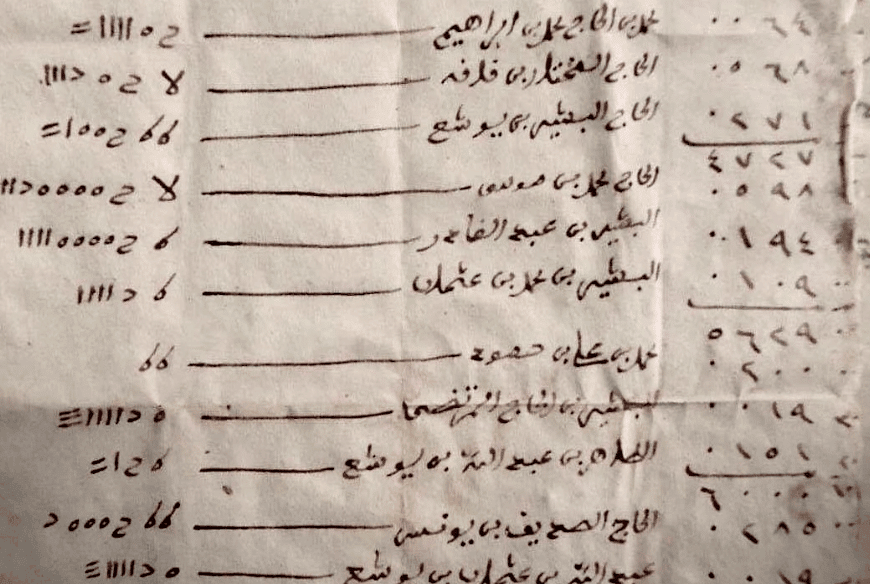Maghreb Voices shared a video on Madghis Madi’s release of documents on the Ibadi Imazighen of Libya hidden from the former Libyan regime and found in Morocco. The manuscripts date back to 500 A.H./1106 A.D and were hidden by intellectuals so they would not be destroyed by the Gaddafi regime.
Thought to be missing, they are still in relatively good condition. On Madi’s site, there is an article on the preservation of heritage. He notes that there are many libraries in the Nafousa mountains but the owners are afraid to publicize their archives. He says by convincing them of public interest, they could contribute to preserving Nafousi history.
Mubarak Belkacem explains that the old word for “Arabic” in Tamazight was Taserɣint and “Arab” was Aserɣin. He says we know this thanks to an ancient Ibadi manuscript called Kitab al-Barbarbiyya. For centuries, this manuscript was distributed among the Ibadis in Tunisia, Libya, and Algeria. In this manuscript, we find further evidence that the Imazighen in the early period of Islamic revelation and the spread of the Khariji (and then Ibadi) doctrine called their language Tamaziɣt.
The author of this manuscript is an Ibadi faqih whose name was Abu Zakariyya Yahya al-Yefreni. The manuscript was written with the aim of translating and explaining Ibadi jurisprudence (from Tamazight to Arabic) to another Ibadi jurist named Abu Ghanim Bishr al-Khorasani, referred to as Boughanim in Amazigh texts. This manuscript explains Islamic jurisprudence according to the Ibadi doctrine (all that relates to faith, prayer, fasting, zakat, marriage, divorce, inheritance, etc.).
We can conclude from the manuscript that the words Aserɣin and Taserɣint were known to the Imazighen since the early spread of Khariji and Ibadi Islam or perhaps before the Rashidi takeover of Egypt and Libya and before the Umayyad expansion to Tunisia and the rest of the Maghrib. The “Amazighification” of the Latin words for Arabic and Arab did not take long. In general, Ibadi Imazighen continued to use their pre-Islamic Amazigh terms in an Ibadi context. The writer of the Ibadi text used the terms Aserɣin and Taserɣint with confidence that the reader would understand it referred to Arabic-speaking Ibadi students.
Among the ancient Amazigh religious terms found in the Ibadi “Amazigh Book” we have these examples:
Yuc = God
Bab enne = our Lord / our Owner / God
Ababay = God / Lord
Ibabayyen = gods
Aykuzen = Islam
Tira = The Book / Quran
Iser = the Prophet
Isaren = the Prophets / Apostles
Anǧlusen = angels (Probably from Latin: angelus)
Adaymun = Satan (Probably from Latin: daemon)
Idaymunen = demons
Tizzarnin = Duhr prayer
Tuqzin = Asr prayer
Tin wučču = Maghrib prayer
Tin yiḍes = Isha prayer
Tin uzečča = Fajr prayer
Tifellas = People of the Book / the People of Jizyah and the Covenant (Jews and Christians)
Imusnawen = jurists
Tafeṣka = Eid
Tifekawin = holidays
Tir meǧǧut / Abekka / Abekkaḍo = sin
Taǧrzawt = remorse / repentance
Amerkidu = reward
Aymir = punishment
Uluf = divorce
Amatus = guardian (of women)
Tamzilt = atonement
Ti toar = reading
Asired / Asine = ablution / washing
Injan = dirt
Tazduni = purity
Yessure = permit / license
Amekkasu = heir
Tiyusawin = inheritance
Amenkuc = the Islamic Dinar
Idaddayen = parents (father and mother)
Timirt = time
Tasefri = house
Enneflen diy-s = differed in
Edduklen fall-as = agreed upon
Aǧǧdet Yuc Bab enne = Fear God our Lord!

